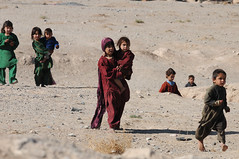Herat, Afghanistan (November 24) – The elders met a coalition convoy at the village edge as scores of dirt-faced children leaped from mound to mound, making their way from their mud huts and nomadic tents to the culvert that separated them from the American service members.
The majority of the children were barefoot, so the fact that the main element of the Nov. 18 humanitarian mission was to deliver shoes was very encouraging to all involved.
In addition to shoes, the U.S. Forces-Afghanistan Detachment West Soldiers presented the children with candy and toys, and gave boxes of food, juice and other beverages to the elders. These types of gifts were rare treats because the Kuchi are nomads, and travel and sustain life with the bare essentials.
Though from a coalition standpoint the gifts were not elaborate, the capacity they may have to positively impact those children’s future is real.
“I believe children have enormous capacity to remember events and people, and hope the Kuchi tribe children in this village will remember coalition forces for their generosity and kindness,” said Army Col. Ricardo E. Ramirez, USFOR-A Det. West commander. “As they get older, hopefully they will maintain a positive attitude towards coalition forces. As adults, maybe they will show kindness and generosity to those less fortunate.”
Reciprocating that type of compassion and charity to less fortunate Afghans would be astounding, particularly when considering the way other Afghans treated the Kuchi in years gone by.
“Historically, most Afghans looked down on the Kuchi because they were traveling people and were not rooted anywhere,” said Atahi Mir Ahmad, a coalition translator who hails from Herat province.
As the Afghan National Army and Afghan National Police grow stronger, more Civil-Military Co-operation (CIMIC) events are made possible, which enables the nation to develop economically and socially. This impacts the Kuchi tribes.
“Day by day, the perception of the Kuchi is increasing as Afghans become more open minded,” Mir Ahmad said. “Currently, I think most Afghans look at them as equal brothers and sisters.”
Kuchi tribes mostly keep sheep and goats. They sell the meat, dairy and wool, in order to buy other necessities like: grain, vegetables, fruit and other commodities not available to nomadic travelers.
This tribe established their temporary village, made of make-shift mud huts and tents, near Camp Arena, a primarily Italian and Spanish base in Herat province, western Afghanistan.
Camp Arena is also home to several dozen U.S. service members who are either embedded with Italian or Spanish forces, or are assigned to USFOR-A Det. West.
For the past several months, using Commanders Emergency Response Program funds, the Soldiers built a new water well directly across from the Kuchi village.
The new well will benefit that particular Kuchi village plus any other Kuchi migrating through the area. It is even possible that the well will prompt these nomadic people to partially inhabit the area, which spawns increased economic development locally.
“In recent times, when a Kuchi tribe finds an area sufficient to sustain their lives, some tribes will begin to inhabit that area and only travel during the spring to find better grazing grounds for their livestock,” said Mir Ahmad. “When spring gives way to summer, the Kuchi may return to their inhabited area.”
Just as coalition efforts are meant to pave the way to a brighter Afghanistan, the local efforts here will hopefully benefit this tribe for many years.
“I hope this well will serve this Kuchi tribe for generations to come,” said Ramirez, explaining that everyone in USFOR-A Detachment West was proud to have been involved with the well.
“We realize this well will significantly change their life,” continued the colonel. “Having a reliable water source will make a huge difference in their everyday life. It will give them a sense of security for their future.”


No comments:
Post a Comment